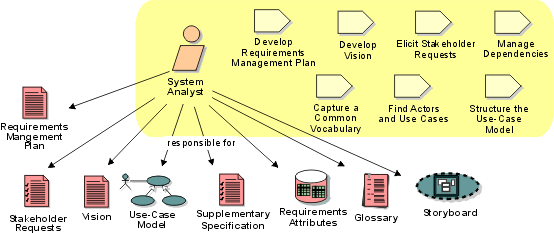Role: System Analyst
|
The System Analyst role leads and coordinates requirements elicitation and use-case modeling by outlining the system's functionality and delimiting the system; for example, identifying what actors exist and what use cases they will require when interacting with the system. |
|
|
|
Description

Related Information

This section provides links to additional information related to this role.
- Whitepaper: Applying Requirements Management with Use Cases
- Guideline: Brainstorming and Idea Reduction
- Concept: Requirements Management
- Whitepaper: The Estimation of Effort Based on Use Cases
- Concept: Traceability
- Whitepaper: Traceability Strategies for Managing Requirements with Use Cases
Staffing

Skills

A person acting in the System Analyst role needs to be, above all else, an expert in identifying and understanding problems and opportunities. This includes the ability to articulate the needs that are associated with the key problem to be solved or opportunity to be realized.
In addition to this, a person paling the role needs to be a good facilitator and must has above-average communication skills. Knowledge of the business and technology domains are useful additional skills for those acting in this role. However, these skills may be of less importance if the individual has the ability to absorb and understand new information quickly. As a core role in the project team, a person playing this role must be able to collaborate effectively with other team members.
Role assignment approaches

The System Analyst role can be assigned in the following ways:
- Assign one or more staff member to perform the System Analyst role only. This is a commonly adopted approach and is particularly suitable for large teams or where the requirements are particularly complex, difficult to elicit or where the Vision is particularly challenging to define and manage.
- Assign one staff member to perform both the System Analyst and Test Manager or Deployment Manager roles. This strategy is a good option for smaller or resource constrained test teams. A person filling both these roles needs to have strong management and leadership skills as well as a prerequisite understanding of the domain or the ability to develop that understanding.
Further Reading

See the references page for further information.

